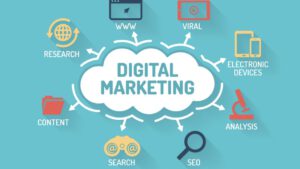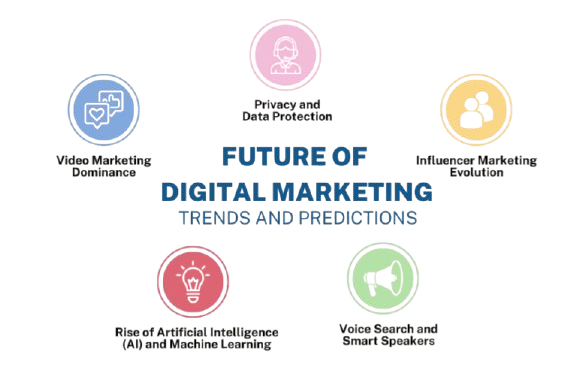Digital marketing is an ever-evolving field that constantly adapts to technological advancements and changes in consumer behavior. As businesses strive to stay ahead of the competition, understanding emerging trends becomes crucial. In this blog, we will explore the future of digital marketing, highlighting key trends that will shape the industry in the coming years.
1. Artificial Intelligence and Automation
Artificial Intelligence (AI) is revolutionizing digital marketing by enabling businesses to personalize customer interactions, analyze vast amounts of data, and optimize marketing strategies in real time. AI-powered tools such as chatbots, predictive analytics, and automated content creation are streamlining marketing processes, reducing costs, and improving efficiency.
AI-driven chatbots are becoming increasingly sophisticated, providing instant and accurate responses to customer inquiries, enhancing user experience, and boosting engagement. Additionally, machine learning algorithms can analyze customer behavior and predict future actions, allowing marketers to create highly targeted campaigns.
2. Voice Search Optimization
With the growing popularity of smart speakers and voice assistants like Siri, Alexa, and Google Assistant, voice search is transforming the way consumers seek information. Voice searches tend to be more conversational and longer than text-based searches, requiring businesses to optimize their content accordingly.

To stay ahead, marketers must focus on natural language processing (NLP), long-tail keywords, and question-based queries. Providing concise, clear, and informative answers will improve a brand’s visibility in voice search results, enhancing organic reach and engagement.
3. The Rise of Video Content
Video marketing continues to dominate digital marketing strategies. Short-form videos, live streaming, and interactive video content are gaining traction across platforms like TikTok, Instagram Reels, and YouTube Shorts. Consumers prefer video content due to its engaging and easily digestible format.
Brands are leveraging video storytelling to connect with audiences emotionally, boost brand awareness, and drive conversions. Additionally, with the rise of virtual reality (VR) and augmented reality (AR), immersive video experiences will become an integral part of marketing campaigns, offering customers a more interactive and engaging experience.
4. Personalization and Hyper-Targeting
Consumers now expect personalized experiences tailored to their preferences and interests. Data-driven marketing enables businesses to deliver highly relevant content, product recommendations, and personalized email campaigns.
Using AI and machine learning, brands can analyze user behavior, purchase history, and browsing patterns to create customized experiences. Personalized marketing not only improves customer satisfaction but also enhances brand loyalty and increases conversion rates.
5. Influencer and Micro-Influencer Marketing
Influencer marketing remains a powerful strategy, but the focus is shifting towards micro-influencers—individuals with smaller but highly engaged audiences. Consumers trust recommendations from authentic influencers more than traditional advertisements.
Brands are collaborating with niche influencers to reach specific target audiences, ensuring higher engagement and credibility. As transparency and authenticity become crucial, marketers must prioritize genuine influencer partnerships over paid promotions.
6. Social Commerce and Shoppable Content
Features like Instagram Shopping, Facebook Marketplace, and TikTok Shop allow consumers to purchase products directly from social media apps.
Shoppable content, including product tags, live shopping events, and in-app checkout options, simplifies the buying process, reducing friction and increasing conversions. Brands that integrate social commerce into their marketing strategy will gain a competitive advantage in the evolving digital landscape.
7. Privacy and Data Protection
With increasing concerns about data privacy, consumers are becoming more cautious about how their personal information is used. Regulations like the General Data Protection Regulation (GDPR) and California Consumer Privacy Act (CCPA) are enforcing stricter data protection laws.
Marketers must prioritize transparency, ethical data collection, and user consent to build trust with customers. First-party data collection, where businesses gather information directly from consumers (e.g., through website interactions, surveys, and loyalty programs), will become more valuable than relying on third-party cookies.
8. The Growth of Interactive and Immersive Content
Interactive content such as quizzes, polls, augmented reality (AR) experiences, and gamified marketing campaigns are gaining popularity. Consumers prefer engaging content that allows them to actively participate rather than passively consume information.
Brands that incorporate interactive content into their digital marketing strategies will enhance user engagement, improve dwell time, and create memorable brand experiences that drive conversions.
9. Sustainability and Ethical Marketing
Consumers are becoming more conscious of environmental and social issues, influencing their purchasing decisions. Brands that align with sustainable practices and ethical marketing will gain consumer trust and loyalty.
Companies are focusing on eco-friendly packaging, transparent supply chains, and social responsibility initiatives. Authenticity and purpose-driven marketing will be key in building meaningful connections with socially conscious consumers.
10. The Future of Search: Zero-Click Searches
Search engine optimization (SEO) is evolving with the rise of zero-click searches, where users find answers directly on search engine results pages (SERPs) without clicking on a website link. Google’s featured snippets, knowledge graphs, and rich answers are changing the SEO landscape.
To adapt, businesses must optimize content for featured snippets, structure data properly, and provide direct answers to common queries. A strong focus on high-quality content and SEO best practices will remain essential for online visibility.
Conclusion
The future of digital marketing is shaped by technological advancements, changing consumer expectations, and evolving industry regulations. Businesses that embrace AI-driven automation, video marketing, personalized experiences, social commerce, and ethical practices will thrive in the competitive digital landscape.
Staying ahead of these trends and adapting marketing strategies accordingly will be key to achieving success in the dynamic world of digital marketing. By leveraging emerging technologies and focusing on customer-centric approaches, brands can create meaningful connections and drive sustainable growth in the years to come.
